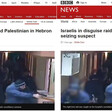Media Watch 20 March 2013
Tomorrow, the BBC will broadcast a Disasters Emergency Committee (DEC) appeal to raise money for the Syrians whose lives have been so dreadfully affected by the two-year conflict in their country.
The broadcast will be seen by many as evidence of the UK state broadcaster’s blatant hostility and hypocrisy towards the people of Palestine, since it refused to air a similar appeal for them in January 2009.
Then, as Israel was coming towards the end of its three-week air, land and sea bombardment of the besieged Gaza Strip, which saw more than 1,400 Palestinians massacred, including 352 children, the BBC was asked to air a DEC appeal to raise money to provide humanitarian aid to Gaza. It refused.
The decision left the 13 aid agencies for whom the DEC is an umbrella organisation, with a shortfall of millions of pounds in donations. The money would have been used to help provide shelter, food and medical aid for the Palestinians in Gaza whose homes and infrastructure had just been destroyed by the Israeli attacks.
After initial confusion caused by the BBC’s decision, all the other UK terrestrial television channels screened the appeal. This is traditional when DEC makes a request for such a screening in order to raise aid for major humanitarian disasters. Contemporary appeals had raised £10 million ($15 million) for Congo and £18 million ($27 million) for Burma.
The public outcry that accompanied the BBC’s unilateral decision included 40,000 complaints from members of the public to the BBC Executive, a motion put forward in Parliament and signed by 120 MPs calling on the BBC to screen the appeal, and widespread criticism from public figures including the Archbishops of Canterbury and York.
Fundamental reasons
The BBC ignored it all. Mark Thompson, then BBC Director General, took to the “Editors’ Blog” on the broadcaster’s website to make his excuses. Reading them now, Thompson’s excuses could apply equally to the current situation in Syria — a situation which the BBC feels is deserving of help.
Thompson wrote in 2009 that the “fundamental reason” for not screening a humanitarian appeal for Gaza was because “Gaza remains a major ongoing news story, in which humanitarian issues – the suffering and distress of civilians and combatants on both sides of the conflict, the debate about who is responsible for causing it and what should be done about it – are both at the heart of the story and contentious.”
Again, using an excuse which could apply equally to the current civil war in Syria, Thompson added: “Inevitably an appeal would use pictures which are the same or similar to those we would be using in our news programmes but would do so with the objective of encouraging public donations. The danger for the BBC is that this could be interpreted as taking a political stance on an ongoing story.”
One wonders what pictures of the Syrian conflict the BBC will use in tomorrow’s DEC appeal. How will it find pictures that aren’t the same or similar to those being used in news programmes? Is the BBC not worried that using such pictures “could be interpreted as taking a political stance on an ongoing story”? Or does the BBC only apply such concerns to fundraising efforts for Palestinians? Thompson said in his 2009 blog that the BBC has a “very strong track record in supporting DEC appeals.” Just not when those appeals want to raise money for Palestinians.
In a supremely arrogant and inaccurate statement, Thompson ended the blog by saying: “However, BBC News and the BBC as a whole takes its responsibility to report the human consequences of situations like Gaza very seriously and I believe our record in doing it with compassion as well as objectivity is unrivalled.”
BBC objectivity
The dictionary meaning of the word “objectivity” may not be known in BBC newsrooms. On 22 November 2012, a ceasefire was signed between Israel and Gaza, ending an eight-day Israeli assault on Gaza which killed more than 170 Palestinians. In the next three months, until 22 February 2013, Israeli forces killed ten Palestinians (six in the West Bank and four in Gaza) and injured 91 people in Gaza and more than 600 in the West Bank. Taking into account more than 100 Israeli military incursions into Gaza during this period and attacks on Gazan fishing boats, there was, on average, at least one breach of the ceasefire every day by Israel.
None of this made it onto the BBC’s mainstream television and radio news bulletins or programmes. The restraint of the Palestinians in not retaliating with a single rocket during this period also went unremarked on by the BBC’s journalists.
On 26 February 2013, a single rocket was fired from Gaza into Israel in response to the death in Israeli custody of Palestinian prisoner, Arafat Jaradat. The rocket caused some damage to a road in Ashkelon. Needless to say, this was news for the “objective” BBC, being reported on headline news bulletins during the day on BBC Radio 4 and making the lead story in the Middle East section of the website. In its radio broadcasts, BBC reporters made no mentions of the unarmed Palestinian civilians killed by Israel in the previous three months as they recorded the damage to an Israeli road.
This, then, is the BBC’s much-trumpeted “objectivity.” Today, the BBC’s website is running a story about the humanitarian situation in Syria as it announces tomorrow’s DEC appeal. The fact that the Syrian civil war is “an ongoing news story” seems not to matter in this case, even though it was so important in the case of Gaza four years ago.






Comments
Syria appeal highlights BBC hypocrisy on Gaza
Permalink Ana Muslimin replied on
The BBC presents itself as the 'voice of the establishment'. When such is the case then it is clear that the 'establishment' is corrupt and no longer has any grasp of what it is that is just and right-minded, and more so promotes and encourages willful ignorance of that which is blatantly false! These people disgust me! It shames me!
An (very) English deception
Permalink Gart Valenc replied on
I used to have a great deal of respect for the news branch of the BBC...not any more! As far as I'm concerned, regarding Palestine's people fight to have their rights recognised, the BBC lost all its credibility the moment it reprimanded its current Middle East editor, Jeremy Bowen, for criticising Israel. Judge for yourself: http://www.dailymail.co.uk/new...
Gart Valenc
Twitter: @gartvalenc
Or maybe the BBC have learnt
Permalink Anonymous replied on
Or maybe the BBC have learnt a lesson over these past four years...
Lack of objectivity by the BBC.
Permalink Ken BRUNTON replied on
I, like many other people, am very disturbed by the total lack of fairness and even handedness by those in charge at the BBC; it seems patently clear that BBC management are scared of the Jewish lobby and individuals.
A moronic barrister makes a complaint about Jeremy Bowen and the BBC crumples.
It flies in the face of the majority view and the Jewish lobby know it; the PR game is lost and most sane observers know that the Israelis are acting ILLEGALLY and like the Fascists they say they hate.
Israeli administrations, on the whole, are a bunch of cruel and fascist state terrorists who practise their own particular version of Apartheid; the settlers are particularly evil Israelis and so justly condemn Israel to the sobriquet, 'Nazirael'.
bbc humanitarian aid for syria; hypocrisy for gaza
Permalink miri replied on
The bbc has consistently told false news regarding Syria, over the last two years. This fundraiser is to set the tone for colonialist overseeing of a balkanized Syria. This is wishful thinking on the part of western imperialism.
Why now?
Permalink eGuard replied on
Even worse: out of 365 days BBC starts this action today ... distracting from the Palestine 24/7.
Even the 2004 Olymics
Permalink Barry M. Watson replied on
Some may regard this Bias complaint to the BBC from way back at the 2004 Olympics in Athens as a trifling -But judge for yourself!
On 15 August 2004 at 09:51, "Barry Watson"
BBC Coverage of opening ceremony of Olympic Games
Dear Sir,
Second only to looking forward to watching my own British team enter the arena, as a supporter of the Palestinian people, and their struggle for freedom, I waited in anticipation for the tiny Palestinian team to enter.
The Palestinian contingent entered, and was on our TV for 19 seconds only, before the TV director (Which one?), quickly, for the only time in a nearly four hour long broadcast of the opening ceremony, pulled away from the normal shots of the teams entering, to show pictures of the British team ( for 1 Minute 4 seconds) in the center of the arena?
What I would like to know is, was it the Greek TV Director who redirected the coverage, thereby cutting any time for comment to be made about the Palestinian team, or was this done from London by the BBC Director???
If this action was taken by the Greek authorities, then I am sure that the people of Panama, Palau and Papua New Guinea will also be upset, having missed the entry of their P teams during the time that the broadcast showed pictures of Tim Henman waving to his Mum ???
Yours sincerely-Barry M. Watson
Dear Mr Watson
Thank you for your e-mail regarding ?Olympics 2004?.
I realise that you had a particular interest in the Palestinian team at the Opening Ceremony. I should explain that the opening ceremony was filmed by the Greek production team, except for the brief period you mention, when the BBC showed their own footage.
We feel that our viewers in the UK would expect this coverage, though I appreciate you felt that this was at the expense of other countries taking part. Please be assured that all of your comments have been registered on our daily log, for the attention of the production team